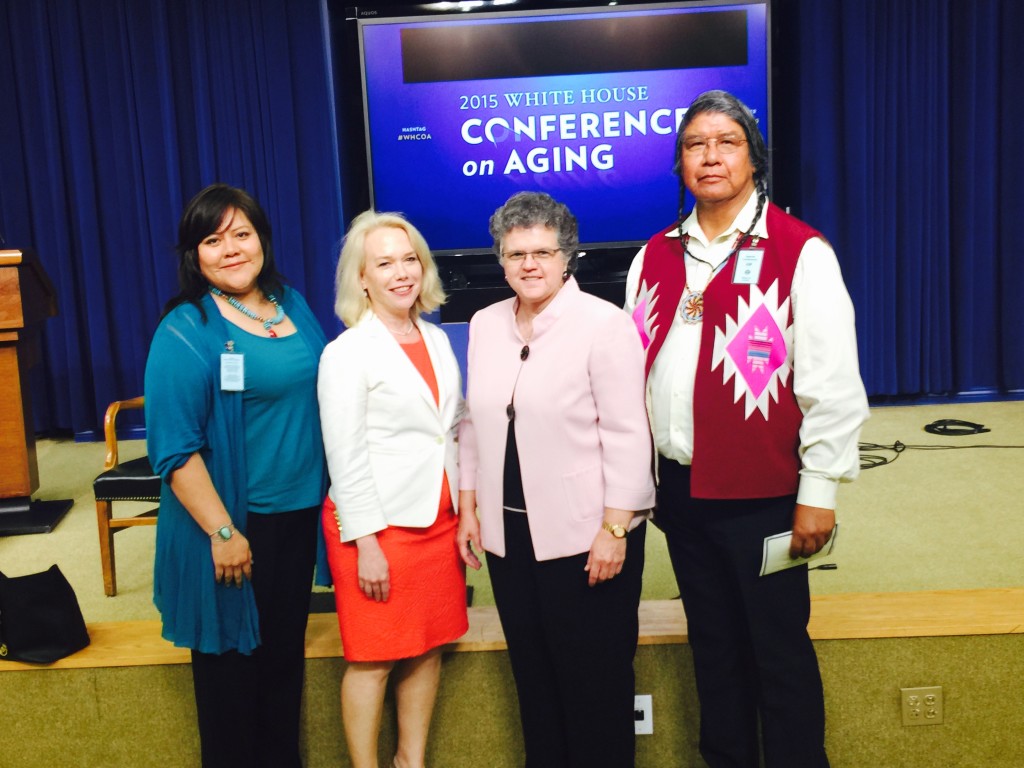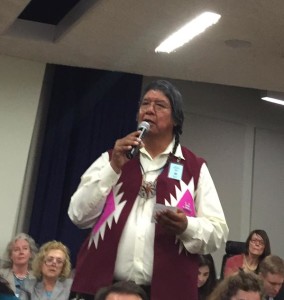The 2015 White House Conference on Aging was a unique experience. It did not follow the traditional path of previous White House Conferences primarily due to the lack of funding and authorizing legislation in support of the process this year. Despite these obstacles, President Obama, Nora Super and the Administration for Community Living were able to create a new approach and focus the nation’s attention on aging issues. Given these challenges, it was a bold accomplishment.
Like others in the Aging Community, I wondered how the virtual format and regional forums would be implemented. My concern was that technology might interfere with direct communication and hinder the process. Many in tribal areas would not be able to participate due to the widespread lack of adequate broadband reception. The digital divide is a challenge faced by many of our Elders every day. From the beginning I sought to ensure that American Indian and Alaska Natives (AI/AN) Elders would have a voice in the proceedings.

One tactic to increase the diversity of the regional forums was to submit AI/AN regional leaders for consideration on the invitation lists. As we prepared the lists we noticed that the locations chosen were large urban settings: Seattle, Phoenix, Tampa, Cleveland and Boston. Indian Country encompasses the entire country, but a significant portion of older AI/ANs live in rural settings and their experiences and ideas would not be heard. In discussions with other Diverse Elders Coalition (DEC) leaders I learned that they had also noted the same lack of inclusion of their minority and LGBT populations.
When we think of aging in this country we need to consciously look and see the diversity of this country and help create networks that will reach into all communities, not just those that are easiest to reach but those that are located in frontier America, rural America and other underserved minority areas. These places tend to be overlooked and often have Elders thriving and doing without while making great use of overburdened family resources.
In order to address this oversight NICOA worked with leaders in Washington, D.C. and Oklahoma to design a listening session for AI/AN Elders. NICOA was fortunate to gain the endorsement of the 2015 White House Conference on Aging leadership and after a whirlwind of activity, the event happened. On May 6th, the 2015 WHCOA Listening Session for American Indian and Alaska Native took place in Norman Oklahoma and was appropriately set in the heart of Indian Country.
Over 100 AI/AN Elders, service providers and tribal leaders attended, representing 33 tribal nations. Caregiver issues, long term services and supports, Social Security, Elder Justice, Elder nutrition programs and many more issues were presented to Assistant Secretary for Aging, Kathy Greenlee. Assistant Secretary Greenlee, a longtime ally for AI/AN Elders, listened until every person was able to present their testimony. The listening session was briefly interrupted by the touchdown of a fierce tornado, but even this force of nature did not hinder the completion of the session. The participants sheltered until it was safe to return and carried on once they received the all clear.

Addressing concerns about Native elder abuse during WHCOA 2015.
This passion and commitment on the part of both the leadership from Washington and the participants illustrates the need for such sessions on an ongoing basis. These conferences occur every ten years, so many Elders have been waiting a long time to be heard.
Our Native Elders were supported throughout the 2015 WHCOA process by dynamic and strong Elder advocates, such as Donna Pino, the president of the New Mexico Indian Council on Aging (NMICOA). Ms. Pino and NMICOA gathered their opinions about the four topic areas and crafted a thorough testimonial addressing each issue. Another influential Elder advocate is Steve Wilson, Chairman of the Oklahoma Indian Council on Aging (OICOA). Mr. Wilson and OICOA leaders notified their members and as a result many tribal Elders from Oklahoma turned out in large numbers for the event. Mr. Wilson also helped to record the event that was shared as part of the record with the 2015 WHCOA staff. Their compassion and commitment for the Elders across Indian Country is powerful. Their actions and NICOA’s highlight the power of advocacy. By advocating and teaching others to advocate, we begin to see a shift towards inclusion in mainstream policies.
It is the responsibility of our leaders to understand and support the needs of our Elders. It is our responsibility to remind our leaders of this crucial commitment. When we overlook our Elders, we are not living up to the goals we set for ourselves. The intent of the Older Americans Act and the creation of the Aging Network was to reach every older adult and provide them with what they need to age at home and in their community with dignity.
The opinions expressed in this article are those of the author and do not necessarily reflect those of the Diverse Elders Coalition.

